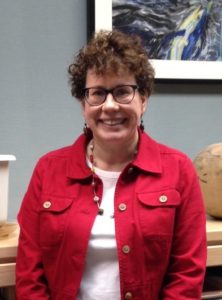To the Guin library, Oregon for our latest #IamMex16 speaker
Dear All,
Happy Monday! October is finally here, and people are probably thinking about what to pack in their bags for Mexico, just two weeks away! Jealous? You know there is still time to book…Â http://www.iamslic.org/conf2016/.
Our next speaker is Mary Markland coming from Oregon State in the USA. Please feel free to come talk to Mary at the conference, she is especially interested in library space and design, library services for graduate students, women in science, travel and gardening. She also spends too much time on Facebook :).

Mary Markland is the head librarian for Oregon State University’s Guin Library at the Hatfield Marine Science Center in Newport, OR. She began this position in May 2015. Mary has a had a long career as a science and medical librarian. She started at Virginia Tech and was most recently at the University of North Dakota School of Medicine’s Southeast Campus in Fargo, ND. She has a BS in Biology with a French minor from Iowa State University and an MA in Library and Information Studies from the University of Wisconsin-Madison. Mary is a newish member of IAMSLIC and Cyamus. This will be her second conference. This will also be her second trip to Merida. Mary is the liaison between IAMSLIC and the Association of College & Research Libraries’ Science & Technology Section. She presented in July at an STS webinar to explain the IAMSLIC organization and reported on the 2015 meeting in Rome.
Mary has co-authored this paper with her colleagues Andrea L. Sevetson, Laurie Bridges and Hannah Gascho Rempel. Unfortunately the other three ladies will not accompany Mary to Merida.
Andrea L. Sevetson received her M.A. in Library and Information Studies from the University of Wisconsin-Madison, and has since been employed as a government documents librarian at the University of California, Berkeley; the US Census Bureau; LexisNexis, and is currently employed as a trainer with ProQuest. She has served as the chair of the American Library Association’s Government Documents Round Table, and was appointed to the US Depository Council to the Public Printer and served as its chair. She is the recipient of the CIS/GODORT/ALA “Documents to the People†Award and the James Bennett Childs Award for distinguished contributions to documents librarianship. She is the author of many articles and editor of The Serial Set: Its Make-up and Content (Bethesda, MD: ProQuest, 2013) and Fundamentals of Government Information (Neal-Schuman, 2011 and Chicago, IL: ALA, 2016).
Laurie Bridges is an Instruction and Outreach librarian at Oregon State University and works directly with the international community on her campus. Laurie’s research interests include undergraduate student engagement, international education, and mobile technologies and libraries.
Hannah Gascho Rempel is a Science Librarian and the Coordinator of Graduate Student Success Services at Oregon State University Libraries. She is also the Editor of The Journal of Web Librarianship. Hannah researches and publishes on a range of topics including graduate student service needs in the library, the intersection of technology use and learning, and research behaviors and curiosity.
Title: Fishy business: fish in the United States Serial Set
Abstract: As a new marine science librarian, I’m learning and re-learning about information resources all the time. While exploring the contents of my file cabinets, I found some random fish lithographs labelled US Japan Expedition. Tracking down the original source led me to re-discover the United States Serial Set. The U.S. Serial Set is a bound series of over 14,000 volumes and contains within it nearly all of the hundreds of thousands of numbered congressional reports and documents published since 1817. While most people use it as a primary source for American history and Congressional reports, its contents range from agricultural yearbooks (aquaculture!), foreign relations (treaties!), geological surveys and a treasure trove of historical data about the United States’ fisheries. You can also find historical reports from explorations in the United States and around the world. From the Annual Reports of the Fish Commission to Admiral Perry’s Expedition to Japan, you can find lists of species, temperatures, hatcheries, maps and beautiful art work capturing the animals, people and landscapes of the region.
Social Media: Library’s web site is http://guin.library.oregonstate.edu




